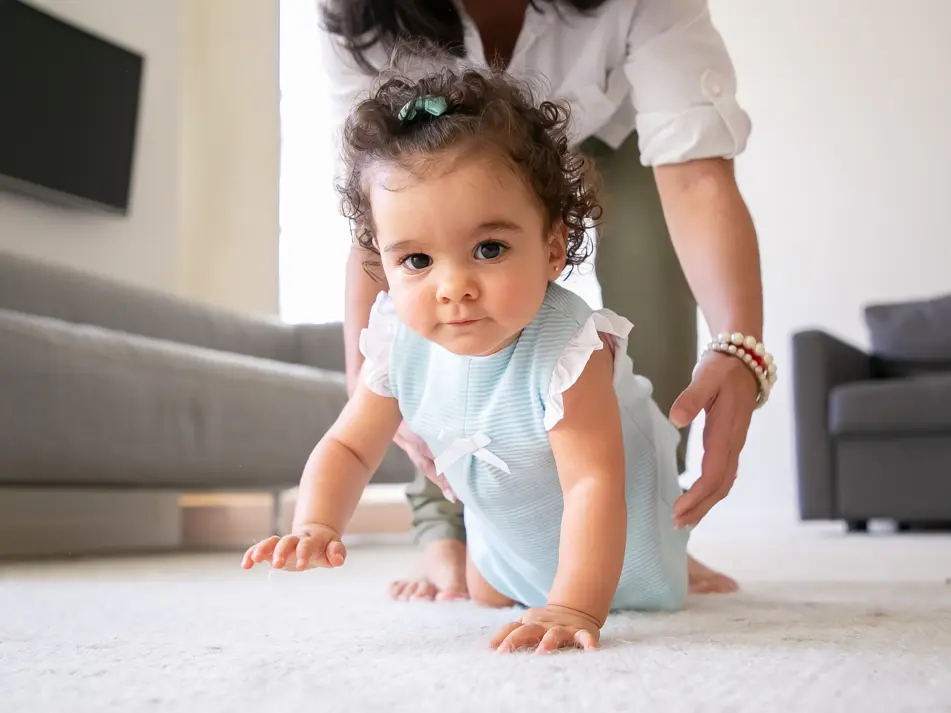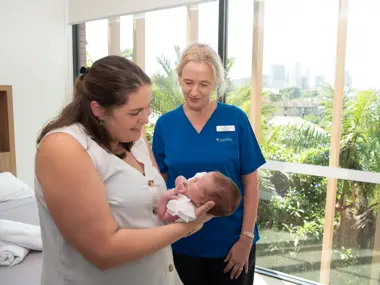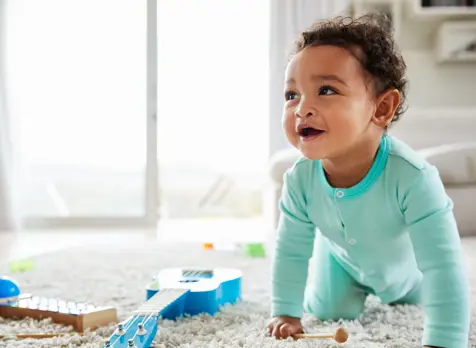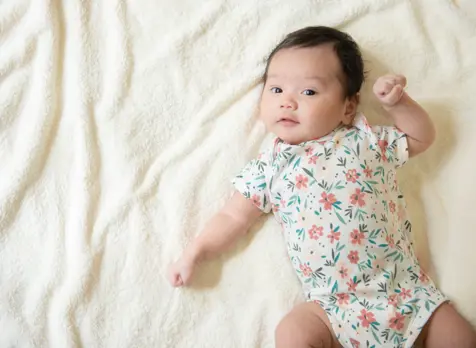Baby Speech Development

Early language development
Regardless of their place of birth or culture, all babies:
- Coo before they babble
- Understand language before they can speak
- Start to speak their first words around 12 months of age.
Babies have an amazing capacity to learn languages. They recognise familiar voices and listen intently from an early age, especially to their parents’ voices.
Babies are also attracted to higher-pitched voices. Interestingly, most adults intuitively start to talk motherese (or parentese) without realising they are doing this. It sounds like a higher-pitched sing song voice, combined with short and simple sentences. For example, ‘you are sooo pretty and so cuuute’.
Babies prefer motherese to regular grown-up voice tones. It has been identified that motherese helps babies learn language through the high pitch, elongated vowels, exaggerated facial expressions and short, simple sentences.
When do babies start babbling?
Long before your baby can speak, they are learning the rules that govern language.
They will start cooing at around two months of age and it will consist of vowel-like sounds; cooing has a pleasant ‘oo’ quality.
Babbling starts at around four to six months of age. Even babies who are deaf from birth start to babble at this time, producing a similar range of sounds. Your baby will repeat consonant-vowel combinations – ‘bababababab’ or ‘dadadadada’. Sometimes mothers get upset as their baby seems to be favouring their father by first saying ‘dadada.’
Cooing and babbling are thought to be an essential component of learning how to talk as they practise moving their lips, tongue, jaw, mouth and making sounds.
This is the time to join in and have a conversation with your baby. Give meaning to your baby’s babbles and coos – ‘you sound so happy today’, ‘I just love it when you talk to me’.
Avoid talking over them, wait for a pause in their babbling, just as in an adult conversation. Leave spaces for them to respond. This can be one of those very special moments with your baby. This is a time to just be in the moment together.
If babies don’t hear talking they are likely to stop babbling, so make sure you talk to your baby frequently and with lots of descriptive words from birth.
Baby language development from 6 months
By the second half of the first year, babies start to understand word meanings. They will turn to their mother when the word mummy is spoken. Your baby will also have an increased awareness of what they want and need. They will start to point, crawl or gesture towards the things they want.
Your baby may stumble upon words like ‘mama’ or ‘bye-bye’. Through your reinforcement, your baby will start to repeat, especially if you act pleased and excited. Using picture books will assist in reinforcing words and relationships.
Around 12 months of age, babies start to use their first words with clear meaning. At this stage they comprehend more words than you probably realise. Differences in language development start to be identified at around 18 months.
Baby speech milestones
From birth
- Cries to indicate distress and need for assistance from parents and others.
Around 1 month
- When content they will utter little guttural noises.
- Will coo and make pre-speech lip and tongue movements in response to parent’s talk from soon after birth.
- Cries lustily when uncomfortable or hungry.
Around 3 months
- Smiles at the sound of your voice.
- Coos and makes other pleasant vowel sounds.
- Shows delight by making sounds when spoken, as well as integrating smiles, eye contact and hand gestures.
- Begins to imitate some sounds.
- Turns head toward the direction of sound.
- Cries when annoyed or uncomfortable.
- Starts to show excitement at the sound of pleasurable experiences, e.g. approaching voices, footsteps and running bathwater.
Around 6 months
- Starting to happily babble tunefully to self and others.
- Laughs, chuckles and squeals aloud during play.
- Has a very large repertoire of sounds, beyond those they regularly hear.
- Responds to own name (around five months).
- Begins to respond to ‘no’.
- Distinguishes emotions by tone of voice.
- Responds to sound by making sounds.
- Uses voice to express joy and displeasure.
- Babbles chains of consonants.
- Starts to include sounds from spoken language.
- Starts to comprehend commonly used words.
Around 9 months
- Repertoire of sounds starts to narrow.
- Deliberate in their vocalisations as means of communication to show friendliness or annoyance.
- Babbles loudly and tunefully in long and repetitive ways.
- Enjoys having conversations with others.
- Reacts by looking around to questions, e.g. ‘where is Mummy/Daddy?’.
- Responds when name is called.
- Responds to ‘no’ (around 10 months).
- Tries to imitate words and sounds, e.g. coughing, makes raspberries, and clicking sounds.
Around 12 months
- Pays increasing attention to speech.
- Responds to simple verbal responses.
- Uses simple gestures, such as waving bye-bye and shaking head for ‘no’.
- Says ‘Mama’ and ‘Dada’ (around 12 to 14 months).
- Shows behaviours that demonstrate the linking of words to actions, e.g. ‘give it to Mummy’.
Around 18 months
- Will start to refer to themselves by name.
- Tries to say three or more words besides “mama” or “dada”
- Will increasingly understand simple phrases and instructions.
- Will point to things and ask you to name them.
- Will increasingly understand and say more words.
When to worry about language development
If you have any concerns that your baby is not reaching these milestones or is losing skills they already had, it's important to investigate early. The earlier intervention is commenced the better the outcomes in most instances.
Speak to your child and family health nurse or GP if you have any concerns.
Learning different languages
Learning more than one language is a real gift for children growing up in a global world. It will provide so many more education and employment opportunities. We know that babies are able to manage learning multiple languages and that language develops a part of the brain that isn't developed by any other experience or interaction.
When babies first start to babble, they make lots of different sounds, including some that are not part of the language they are hearing. By nine or 10 months their repertoire of babbling sounds start to narrow to the set of sounds they regularly hear in their everyday environment. The other sounds are then dropped.
This knowledge about the repertoire of sounds babies instinctively make highlights the importance of reinforcing these sounds, so they are not lost. Parents are encouraged to expose their babies to more than one language in their first year so their babies will simultaneously learn these languages. If babies don't have this opportunity they may find it more difficult learning a second language later in life.
Some parents are very committed to teaching their baby sign language. This is especially true if they, as adults, are dependent on signing to communicate or their baby has been diagnosed with a hearing problem.
It has been demonstrated that babies can learn the signs for simple objects and tasks, e.g. sleep, play and eat. It is believed that this reduces the baby’s frustration as its cognitive development is greater than language development.
As with most learning it requires parents to be persistent and willing to provide lots of repetition to reinforce your baby’s learning. More information is commercially available on the internet however make sure the providers of the program have appropriate qualifications and experience before signing up.






































